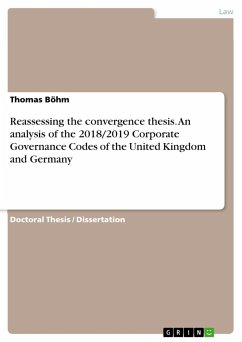Doctoral Thesis / Dissertation from the year 2019 in the subject Law - Civil / Private, Trade, Anti Trust Law, Business Law, grade: A, University of Edinburgh (Edinburgh Law School), course: Dissertation in Law, language: English, abstract: This paper presents a reassessing the convergence thesis. It takes the adoption of the new German Corporate Governance Code 2019 ("GCGC") as an opportunity to verify the thesis whether signs of convergence of contrasting corporate governance systems towards a single model are evident. For this purpose, a comparative analysis of the GCGC and the UK Corporate Governance Code 2018 ("UKCGC") is conducted. The UKCGC and the GCGC originate from competing corporate governance systems - the UK (enlightened) shareholder value model and the German stakeholder model - so the two Codes are ideally suited for a comparative analysis to verify the convergence thesis. It shows that the advancing globalization has generally contributed to a shift towards an Anglo-American corporate governance pattern in European countries.Convergence is also attributable to the harmonization of national laws through EU legislation. The comparative analysis of the UKCGC and the GCGC reveals broad signs of convergence with a large number of similar corporate governance mechanisms and provisions. Nevertheless, there are still region-specific differences in the Corporate Governance Codes that can be traced to the underlying corporate governance philosophy. However, board practice demonstrates that the structural differences between the two corporate governance systems are blurring. The comparative analysis also illustrates that the Corporate Governance Codes are converging from both sides.
Bitte wählen Sie Ihr Anliegen aus.
Rechnungen
Retourenschein anfordern
Bestellstatus
Storno








